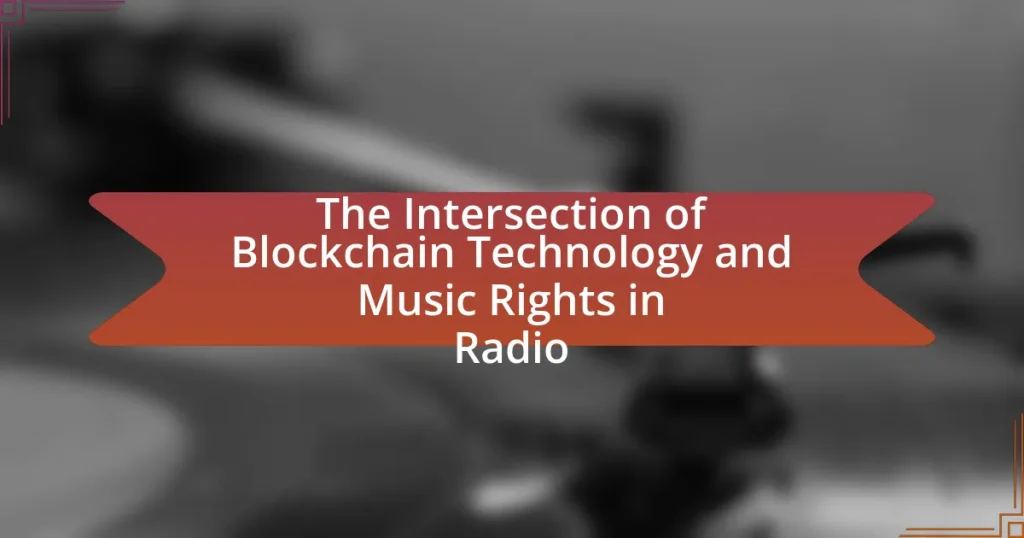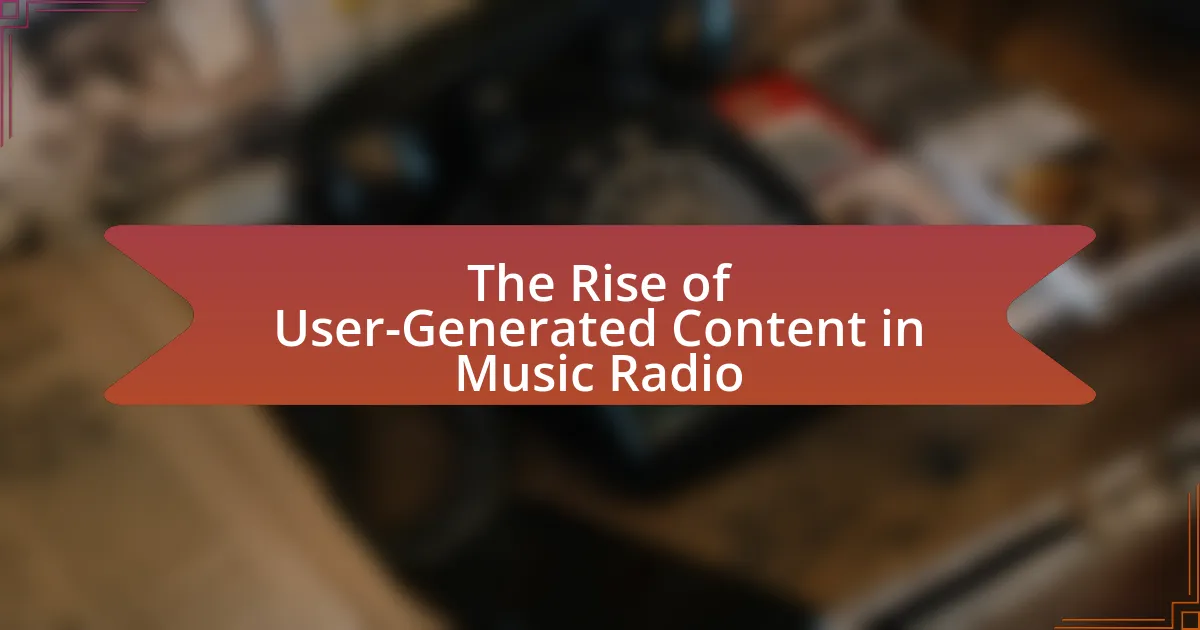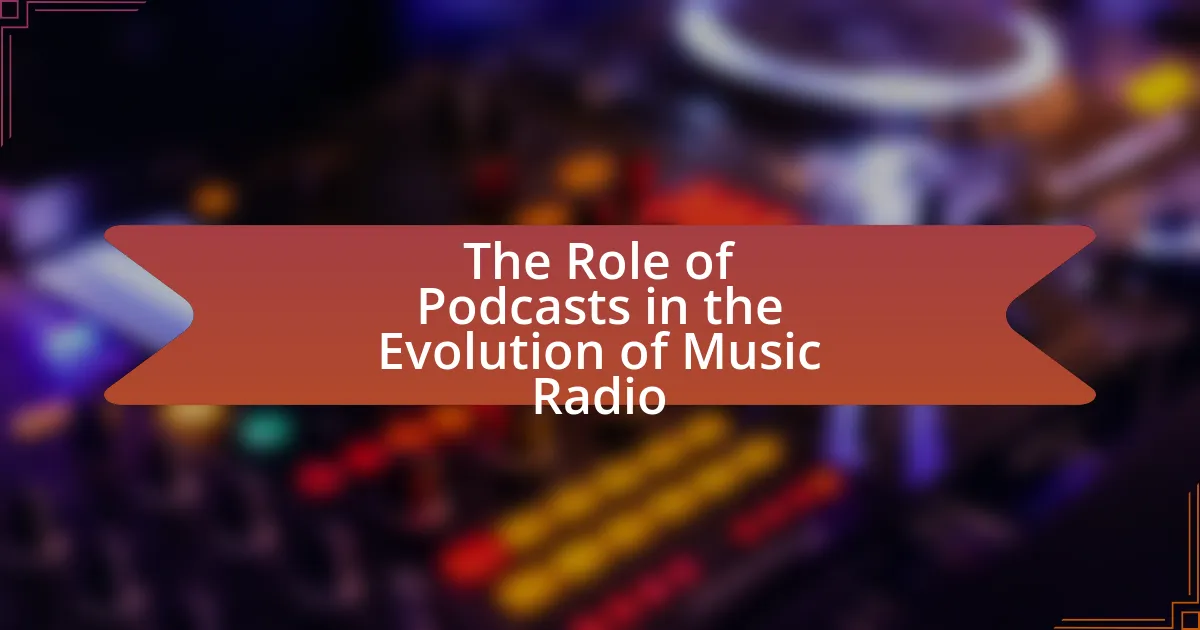The article examines the intersection of blockchain technology and music rights management in the radio industry. It highlights how blockchain facilitates transparent and efficient tracking of music ownership and usage rights, enabling artists and rights holders to receive fair compensation through automated royalty payments via smart contracts. Key features such as decentralization and transparency are discussed, along with current applications of blockchain in music rights, including platforms like Audius and Ujo Music. The article also addresses the challenges faced by traditional music rights management systems and explores the future implications of blockchain technology in enhancing the music ecosystem within radio.
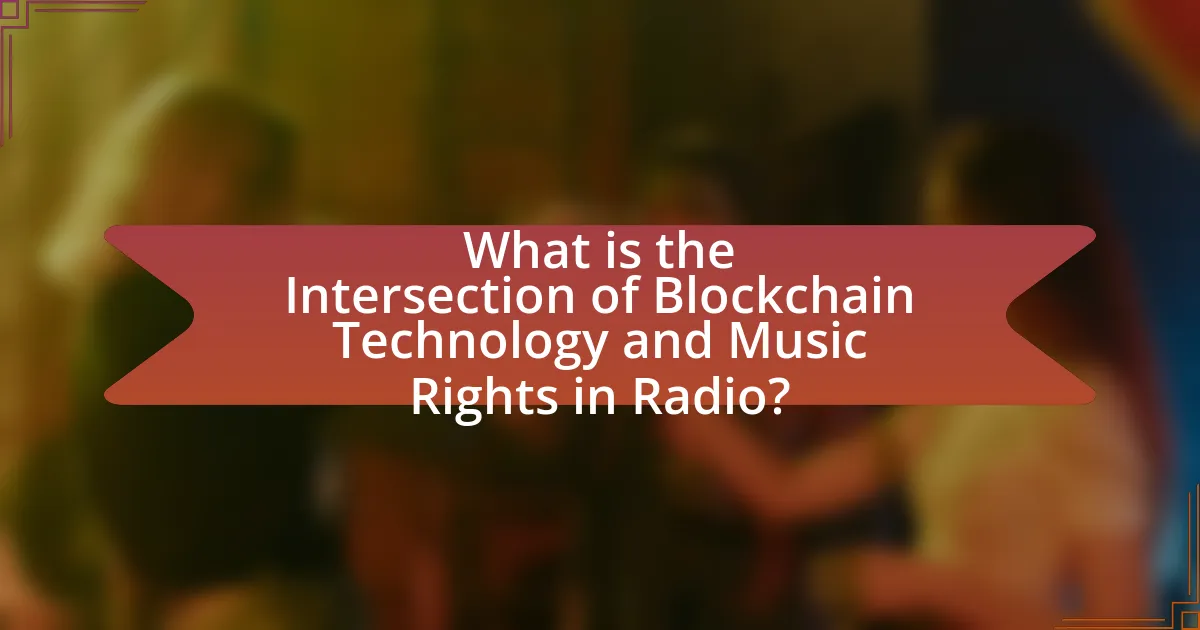
What is the Intersection of Blockchain Technology and Music Rights in Radio?
The intersection of blockchain technology and music rights in radio involves the use of decentralized ledgers to manage and distribute music rights more transparently and efficiently. Blockchain enables artists and rights holders to register their works, ensuring that ownership and usage rights are clearly documented and immutable. This technology can streamline royalty payments by automating transactions through smart contracts, reducing delays and disputes over payments. For instance, platforms like Audius and Ujo Music leverage blockchain to facilitate direct payments to artists, enhancing their revenue streams and ensuring fair compensation.
How does blockchain technology relate to music rights in the radio industry?
Blockchain technology enhances music rights management in the radio industry by providing a transparent and immutable ledger for tracking ownership and usage rights. This technology allows for real-time updates and verification of music rights, ensuring that artists and rights holders receive accurate compensation for airplay. For instance, platforms utilizing blockchain can automate royalty distribution through smart contracts, which execute payments based on predefined conditions, thus reducing administrative costs and delays. The integration of blockchain in this context addresses longstanding issues of copyright infringement and royalty mismanagement, as evidenced by initiatives like Myco, which aims to streamline music rights tracking and payment processes.
What are the key features of blockchain technology that impact music rights?
The key features of blockchain technology that impact music rights include decentralization, transparency, and smart contracts. Decentralization allows for a distributed ledger that eliminates the need for intermediaries, enabling artists to retain more control over their rights and revenues. Transparency ensures that all transactions are recorded and accessible, which helps in tracking the usage of music and ensuring that artists receive fair compensation. Smart contracts automate royalty payments based on predefined conditions, reducing administrative costs and delays in payment distribution. These features collectively enhance the efficiency and fairness of music rights management, as evidenced by initiatives like Ujo Music, which utilizes blockchain to streamline royalty distribution for artists.
How does blockchain enhance transparency in music rights management?
Blockchain enhances transparency in music rights management by providing a decentralized and immutable ledger that records all transactions related to music rights. This technology allows artists, producers, and rights holders to track ownership and usage of their work in real-time, ensuring that all parties have access to the same information. For instance, when a song is played on a streaming platform, the blockchain can automatically log the play and distribute royalties accordingly, reducing disputes over payments. A study by the Berklee College of Music highlights that blockchain can streamline royalty distribution, making it more efficient and transparent, thus fostering trust among stakeholders in the music industry.
Why is the intersection of blockchain and music rights important for radio?
The intersection of blockchain and music rights is important for radio because it enhances transparency and efficiency in royalty distribution. Blockchain technology allows for the creation of immutable records of music ownership and usage, ensuring that artists receive fair compensation for their work. According to a report by the World Intellectual Property Organization, the music industry loses billions annually due to inefficient royalty tracking and distribution. By utilizing blockchain, radio stations can streamline the process of tracking plays and distributing royalties, thereby reducing disputes and ensuring that rights holders are paid accurately and promptly. This technological integration not only benefits artists but also improves the overall integrity of the music ecosystem within the radio industry.
What challenges do traditional music rights management systems face?
Traditional music rights management systems face significant challenges, including inefficiencies in tracking and distributing royalties. These systems often rely on outdated processes that can lead to inaccuracies in royalty payments, resulting in artists not receiving fair compensation for their work. For instance, a report by the International Confederation of Societies of Authors and Composers (CISAC) highlighted that up to 85% of music royalties go uncollected due to these inefficiencies. Additionally, the complexity of rights ownership, especially with multiple stakeholders involved, complicates the management process, leading to disputes and delays in payments. These challenges hinder transparency and trust within the music industry, making it difficult for artists to navigate their rights effectively.
How can blockchain technology address these challenges?
Blockchain technology can address challenges in music rights management by providing a transparent and immutable ledger for tracking ownership and usage rights. This technology enables artists and rights holders to register their works on a decentralized platform, ensuring that all transactions related to music rights are recorded in real-time and are easily accessible. For instance, a study by the Berklee College of Music highlights that blockchain can reduce disputes over royalties by allowing for automatic and accurate distribution of payments based on smart contracts, which execute transactions when predefined conditions are met. This capability not only enhances trust among stakeholders but also streamlines the process of rights management, ultimately benefiting artists and ensuring they receive fair compensation for their work.
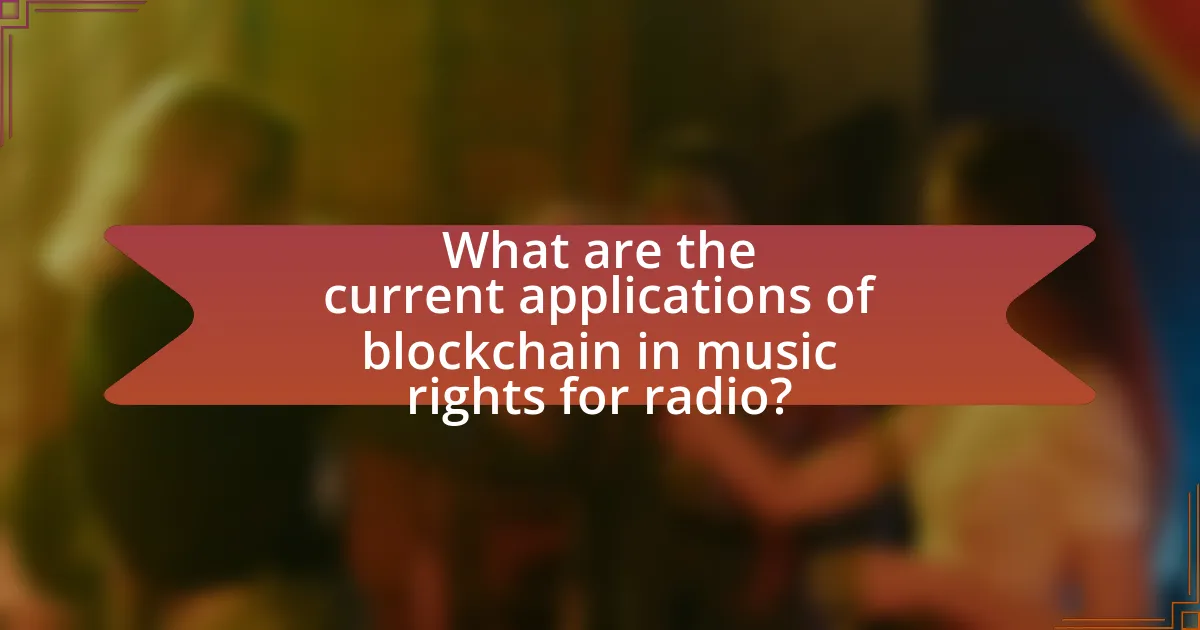
What are the current applications of blockchain in music rights for radio?
Current applications of blockchain in music rights for radio include transparent royalty distribution, rights management, and enhanced tracking of music usage. Blockchain technology enables real-time tracking of plays and automatic royalty payments to artists and rights holders, reducing disputes and ensuring fair compensation. For instance, platforms like Audius utilize blockchain to allow artists to directly manage their rights and earnings, while companies such as Ujo Music focus on smart contracts to automate licensing agreements. These applications demonstrate how blockchain can streamline processes and improve transparency in the music industry, particularly for radio broadcasts.
How are radio stations currently utilizing blockchain technology?
Radio stations are currently utilizing blockchain technology to enhance transparency and efficiency in music rights management. By implementing blockchain, these stations can create immutable records of music usage, ensuring that artists and rights holders receive accurate and timely royalties. For instance, platforms like Audius and Ujo Music leverage blockchain to facilitate direct payments to artists based on real-time data, reducing the complexities of traditional royalty distribution. This approach not only streamlines the payment process but also fosters trust among stakeholders by providing verifiable data on music plays and rights ownership.
What specific use cases demonstrate the effectiveness of blockchain in music rights?
Blockchain technology effectively manages music rights through use cases such as decentralized music distribution platforms, automated royalty payments, and transparent rights management. For instance, platforms like Audius utilize blockchain to allow artists to distribute their music directly to fans, ensuring that they retain a larger share of revenue compared to traditional models. Additionally, companies like Ujo Music leverage smart contracts to automate royalty payments, ensuring that artists receive payments instantly and transparently whenever their music is played. Furthermore, the use of blockchain for rights management, as seen in initiatives like Myco, provides a clear and immutable record of ownership and usage rights, reducing disputes and enhancing trust among stakeholders in the music industry. These examples illustrate how blockchain enhances efficiency, transparency, and fairness in music rights management.
How do artists benefit from blockchain implementations in radio?
Artists benefit from blockchain implementations in radio by gaining enhanced transparency and control over their music rights and royalties. Blockchain technology allows for the creation of immutable records that track music usage and ensure that artists receive fair compensation for their work. For instance, smart contracts can automate royalty payments, reducing delays and disputes, which is crucial in an industry where artists often face challenges in receiving timely payments. Additionally, blockchain can facilitate direct interactions between artists and their audience, bypassing traditional intermediaries, thus allowing artists to retain a larger share of their earnings. This shift not only empowers artists financially but also fosters a more equitable music ecosystem.
What role do smart contracts play in music rights management?
Smart contracts play a crucial role in music rights management by automating the execution of agreements between artists, producers, and distributors. These self-executing contracts, built on blockchain technology, ensure that rights holders receive payments automatically when their music is used, thereby reducing the need for intermediaries. For instance, a smart contract can be programmed to distribute royalties in real-time based on predefined conditions, such as the number of streams or downloads. This automation not only enhances transparency but also minimizes disputes over payments, as all transactions are recorded on an immutable ledger. The use of smart contracts in music rights management has been supported by various studies, including a report by the World Intellectual Property Organization, which highlights their potential to streamline royalty distribution and improve the efficiency of rights management processes.
How do smart contracts automate royalty payments for radio broadcasts?
Smart contracts automate royalty payments for radio broadcasts by executing predefined conditions on a blockchain, ensuring that artists receive payments instantly and transparently when their music is played. These contracts contain the terms of the royalty agreements, including payment percentages and distribution rules, which are automatically enforced without the need for intermediaries. For example, when a song is broadcast, the smart contract triggers a payment to the rights holders based on the agreed terms, utilizing real-time data from the broadcast. This process reduces administrative costs and delays, as evidenced by projects like Audius, which leverage blockchain technology to streamline music distribution and payment processes.
What are the potential pitfalls of using smart contracts in this context?
The potential pitfalls of using smart contracts in the context of music rights in radio include legal ambiguities, coding errors, and lack of flexibility. Legal ambiguities arise because smart contracts may not fully comply with existing copyright laws, leading to disputes over rights and ownership. Coding errors can result in unintended consequences, such as incorrect royalty distributions, which can financially harm artists and rights holders. Additionally, the inflexibility of smart contracts can hinder the ability to adapt to changes in agreements or regulations, making it difficult to address unique situations that require human judgment. These issues highlight the need for careful consideration and oversight when implementing smart contracts in the music industry.
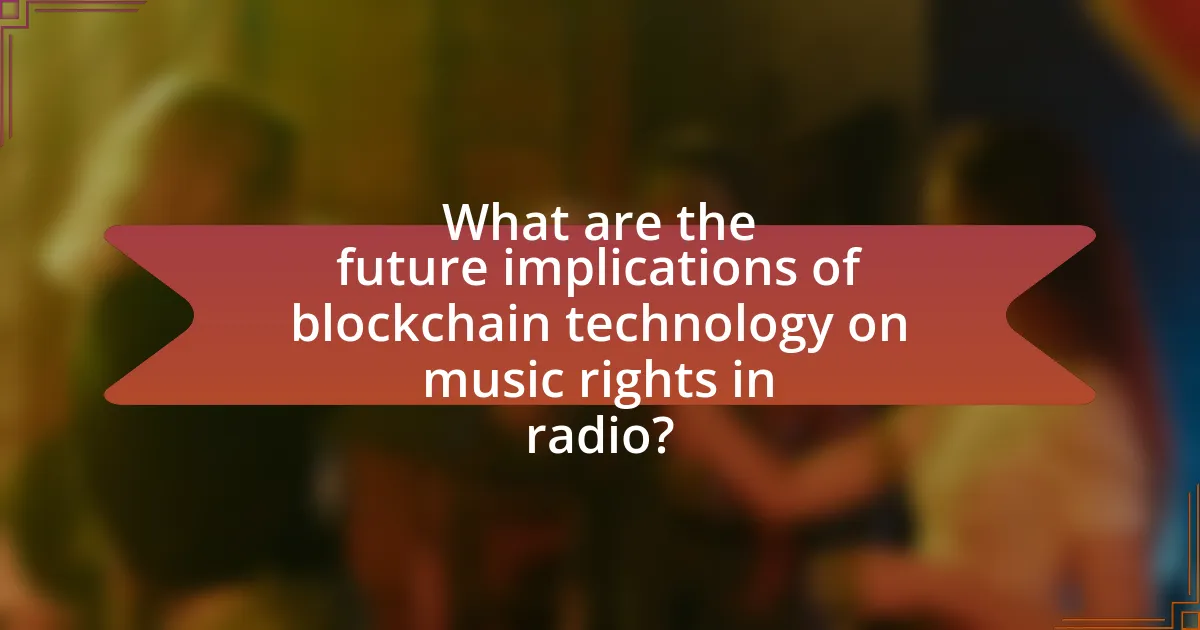
What are the future implications of blockchain technology on music rights in radio?
Blockchain technology will significantly enhance the management of music rights in radio by providing a transparent and immutable ledger for tracking ownership and usage. This transparency will reduce disputes over royalties and ensure that artists receive fair compensation for their work, as blockchain can automate royalty distribution through smart contracts. According to a report by the World Economic Forum, blockchain could streamline the music industry by enabling real-time tracking of music plays and ensuring that payments are made directly to rights holders without intermediaries. This shift could lead to a more equitable distribution of revenue, fostering a healthier ecosystem for artists and creators in the radio industry.
How might blockchain technology evolve in the music rights landscape?
Blockchain technology is likely to evolve in the music rights landscape by enhancing transparency and efficiency in rights management. As artists and rights holders increasingly adopt blockchain, smart contracts can automate royalty distribution, ensuring that payments are made instantly and accurately based on predefined conditions. This evolution is supported by the fact that blockchain’s decentralized nature allows for a tamper-proof record of ownership and usage, which can significantly reduce disputes over rights and royalties. Additionally, platforms like Audius and Ujo Music are already demonstrating how blockchain can facilitate direct transactions between artists and listeners, further validating the potential for blockchain to transform the music rights ecosystem.
What trends are emerging in the integration of blockchain and music rights?
Emerging trends in the integration of blockchain and music rights include increased transparency in royalty distribution, enhanced copyright protection, and the rise of decentralized platforms for music distribution. Blockchain technology allows for real-time tracking of music usage, ensuring that artists receive fair compensation for their work. For instance, platforms like Audius utilize blockchain to enable artists to directly monetize their music without intermediaries, which can lead to higher revenue shares for creators. Additionally, smart contracts are being adopted to automate royalty payments, reducing administrative costs and errors. This shift towards decentralized systems is supported by a growing number of partnerships between blockchain companies and music rights organizations, indicating a significant movement towards more equitable practices in the music industry.
How could regulatory changes impact the use of blockchain in this field?
Regulatory changes could significantly impact the use of blockchain in the music rights field by altering compliance requirements and operational frameworks. For instance, stricter regulations may necessitate enhanced transparency and reporting standards for blockchain systems, which could lead to increased operational costs for music rights organizations. Additionally, changes in copyright laws could affect how blockchain is utilized for tracking ownership and royalties, potentially limiting its effectiveness in ensuring fair compensation for artists. Historical examples, such as the implementation of the Digital Millennium Copyright Act in the U.S., demonstrate how regulatory shifts can reshape industry practices and technology adoption.
What best practices should radio stations consider when adopting blockchain technology?
Radio stations should prioritize transparency, security, and interoperability when adopting blockchain technology. Transparency ensures that all transactions related to music rights are visible and verifiable, which can help in building trust with artists and stakeholders. Security is crucial to protect sensitive data and intellectual property, as blockchain’s decentralized nature can mitigate risks of data breaches. Interoperability allows different blockchain systems to communicate, facilitating smoother integration with existing systems and enhancing collaboration across the music industry. These best practices are supported by the growing trend of blockchain adoption in various sectors, which highlights the importance of secure and transparent transactions in maintaining stakeholder confidence.
How can radio stations ensure compliance with music rights regulations while using blockchain?
Radio stations can ensure compliance with music rights regulations while using blockchain by implementing smart contracts that automate royalty payments and track usage data transparently. Smart contracts can be programmed to execute payments to rights holders based on predefined conditions, ensuring that artists receive fair compensation in real-time. This approach aligns with the requirements set by organizations like the Performing Rights Organization (PRO), which mandates accurate reporting of music usage. Additionally, blockchain’s immutable ledger provides a reliable record of all transactions, which can be audited to verify compliance with licensing agreements and copyright laws. This method not only enhances transparency but also reduces the risk of disputes over royalties, as all parties have access to the same data.
What strategies can enhance the effectiveness of blockchain in music rights management?
Implementing smart contracts is a key strategy to enhance the effectiveness of blockchain in music rights management. Smart contracts automate royalty distribution, ensuring that artists receive payments instantly upon usage of their music, which addresses the traditional delays in payment processes. Additionally, utilizing decentralized ledgers increases transparency, allowing all stakeholders, including artists, producers, and distributors, to track rights ownership and usage in real-time. This transparency reduces disputes over rights and ensures fair compensation. Furthermore, integrating blockchain with existing digital platforms can streamline the onboarding process for artists and rights holders, making it easier for them to register their works and manage their rights efficiently. These strategies collectively improve the accuracy and speed of rights management in the music industry.
